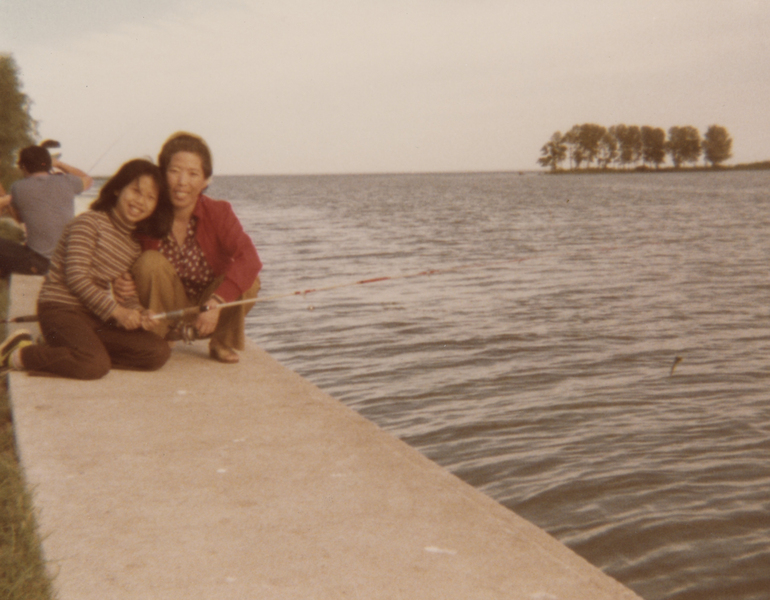
When Grief Becomes a Lifelong Investigation
MOVIE REVIEW
There Are No Words
–
Genre: Documentary
Year Released: 2025
Runtime: 1h 39m
Director(s): Min Sook Lee
Where to Watch: shown at the 2025 Toronto International Film Festival
RAVING REVIEW: How do you confront a silence that’s lasted over four decades? Min Sook Lee’s THERE ARE NO WORDS begins with that question and carries it with determination through every frame. It’s a documentary that refuses to look away from a family’s wounds, even when the pain is too heavy to articulate. The result is a deeply personal film that expands far beyond one individual’s story, speaking to generational trauma and the complex intersections of memory, love, and loss.
Lee’s mother died by suicide when Lee was 12. That kind of loss leaves a shadow, but also a void—one often filled by silence or half-truths. This film is Lee’s attempt to reclaim the missing pieces of her family’s history. Her approach is not sensational or exploitative; instead, she invites the audience into a deeply vulnerable process of discovery. The camera follows her through Toronto and her roots in South Korea, as she talks with her father, relatives, and family acquaintances. What emerges is not just a portrait of her mother but a reckoning with the forces that shaped her family’s story, from the personal to the political.
The most compelling aspect is Lee’s relationship with her father, a former intelligence officer. He’s a fascinating figure—partly because his memories are contradictory, possibly unreliable, and certainly incomplete. Lee does not shy away from pressing him on his past, and these scenes give the film its emotional and narrative backbone. The conversations are sometimes uncomfortable, but they never feel cruel. Instead, there’s an honesty in how Lee holds space for complexity: her father is neither reduced to a villain nor a saint. His past unfolds against the broader context of Korean political history, connecting individual family secrets to national narratives of upheaval and repression.
Lee’s method is investigative, but not in a cold, journalistic sense. Instead, she allows the weight of each revelation to sit with the viewer. When she learns new information about her mother, she lets us see her process it in real time. That vulnerability transforms what could have been a distant biographical film into something immediate and intimate. It’s as much about how grief evolves as it is about uncovering facts. This journey is universal; even if the circumstances are unique, the emotions resonate deeply.
The images are contemplative and deliberate, whether lingering on Lee’s face as she listens to a neighbour or capturing the streets of Hwasun, South Korea, where parts of her family’s past remain etched in place. Archival material is woven into the narrative, not just as a historical record, but as an integral part of the emotional texture of the story. Old photographs and news footage don’t merely illustrate—they haunt, reminding us how the past persists.
The film does not shy away from its heavy subject matter. Discussions of suicide and its aftermath are there. But Lee approaches the topic with care and awareness, including content advisories and, importantly, centering the experiences of survivors of loss. While the story is anchored in her own grief, it gestures outward to the broader impact such losses have on communities and across generations.
Where the film particularly shines is in its exploration of how trauma crosses borders and languages. The interviews with extended family members in South Korea highlight how cultural expectations, silence, and stigma can persist across continents. Lee’s willingness to question these dynamics makes the film more than just a personal memoir; it becomes a meditation on how societies handle—or fail to handle—mental health and loss.
At 99 minutes, Lee allows her story to unfold slowly, giving space to thoughts about political context or extended family history. Yet that patience feels essential. Grief is not tidy; it does not move in straight lines. The film mirrors that reality rather than imposing a false narrative arc. Those looking for clear answers may be frustrated, but that’s part of Lee’s point: some absences can never be fully resolved.
What’s remarkable is how cathartic the film feels, yet it doesn't offer the closure you’d expect. By the end, Lee hasn’t uncovered every truth or tied up every loose end. Instead, she’s created a space where silence is no longer the only option. For viewers who have experienced their own losses, particularly those marked by unanswered questions, this openness is likely to feel both painful and validating.
As with any documentary tackling sensitive subject matter, there will be viewers for whom this is too close to home. But for those who engage with it, Lee’s film offers something rare: a space for empathy and understanding, a reminder that grief shared is grief transformed. It’s not an easy watch, nor should it be. For a film about what cannot be said, THERE ARE NO WORDS has plenty to communicate. It’s a powerful addition to the NFB’s legacy of personal storytelling and a deeply human work that deserves attention far beyond the festival circuit.
Please visit https://linktr.ee/overlyhonestr for more reviews.
You can follow me on Letterboxd, Instagram, Twitter, and YouTube. My social media accounts can also be found on most platforms by searching for 'Overly Honest Reviews'.
I’m always happy to hear from my readers; please don't hesitate to say hello or send me any questions about movies.
[photo courtesy of NATIONAL FILM BOARD OF CANADA (NFB)]
DISCLAIMER:
At Overly Honest Movie Reviews, we value honesty and transparency. Occasionally, we receive complimentary items for review, including DVDs, Blu-rays, CDs, Vinyl Records, Books, and more. We assure you that these arrangements do not influence our reviews, as we are committed to providing unbiased and sincere evaluations. We aim to help you make informed entertainment choices regardless of our relationship with distributors or producers.
Amazon Affiliate Links:
Additionally, this site contains Amazon affiliate links. If you purchase through these links, we may receive a commission. This affiliate arrangement does not affect our commitment to honest reviews and helps support our site. We appreciate your trust and support in navigating these links.



Average Rating